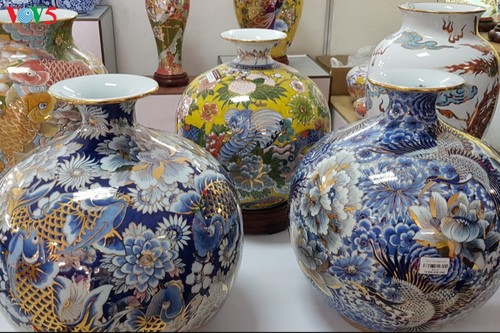 Bat Trang ceramic village's products Bat Trang ceramic village's products |
The OCOP program promotes advantageous agricultural, non-agricultural, and service products in each locality based on value chains, which will be realized by private economic sectors and the collective economy.
The program focuses on 6 groups of goods and services - food, beverages, herbs, souvenirs-furniture-decorations, fabrics-apparel, and rural tourism services. OCOP products are ranked into 5 levels, of which the 5-star level is the highest, meeting international standards.
Hanoi’s Rural Development Sub-Department has been assigned to coordinate with localities to implement the program, the largest in Vietnam’s 63 provinces and cities.
Nguyen Van Chi, the Department’s Director and Deputy Chief of Hanoi New Style Rural Coordination Office, said: “In 2019 and 2020, we have to identify which products can be used as OCOP products and evaluate their quality. Pursuant to the central-level roadmap, there should be about 2,500 products in two years, of which Hanoi must have 1,000. Last year, Hanoi already chose 300 products and plans to have 700 products this year. Hanoi will build an innovation and design center in Dong Anh district near Noi Bai International Airport to introduce OCOP products.”
Hanoi has the most craft villages in Vietnam, 1,350, nearly one-third of the total number. It also leads the country in using QR codes to track agriculture, forestry, fishery and food products. More than 5,000 products are now identified by bar-code and are the foundation of Hanoi’s OCOP program. Hanoi officials continue to encourage collectives and individuals to register their trademarks and run marketing campaigns.
Ta Van Tuong, Deputy Director of the municipal Department of Agriculture and Rural Development, said: “The Ministry of Agriculture and Rural Development and the Hanoi People's Committee have jointly organized a program to connect supply chains of safe agricultural products in Hanoi. There are 1,263 chains nationwide. Hanoi will work with all provinces and cities across Vietnam to develop these chains. Hanoi has been and will be a center for producing high quality breeds and seedlings for the whole country.”
Hanoi will standardize at least half of existing craft villages and agricultural products. It is investing in Bat Trang ceramic village in Gia Lam district, Van Phuc silk village in Ha Dong district, and Duong Lam village in Son Tay town to create OCOP products in combination with tourism development. It is calling on businesses to invest in high-tech or bio-tech agriculture.
Dam Tien Thang, Deputy Director of Hanoi’s Department of Industry and Trade, said: “Hanoi pays close attention to the policy on craft village development under which each village should turn out more than one leading enterprise. These businesses will lead and support local small production facilities which don’t have enough personnel, technology, or experience to make items for export.”
This year, Hanoi plans to consolidate management and administration of the OCOP program. Its goal is to make sure that all businesses, cooperatives, and households who register to participate in the OCOP program are trained and that 100 products will be certified as 5-star level.